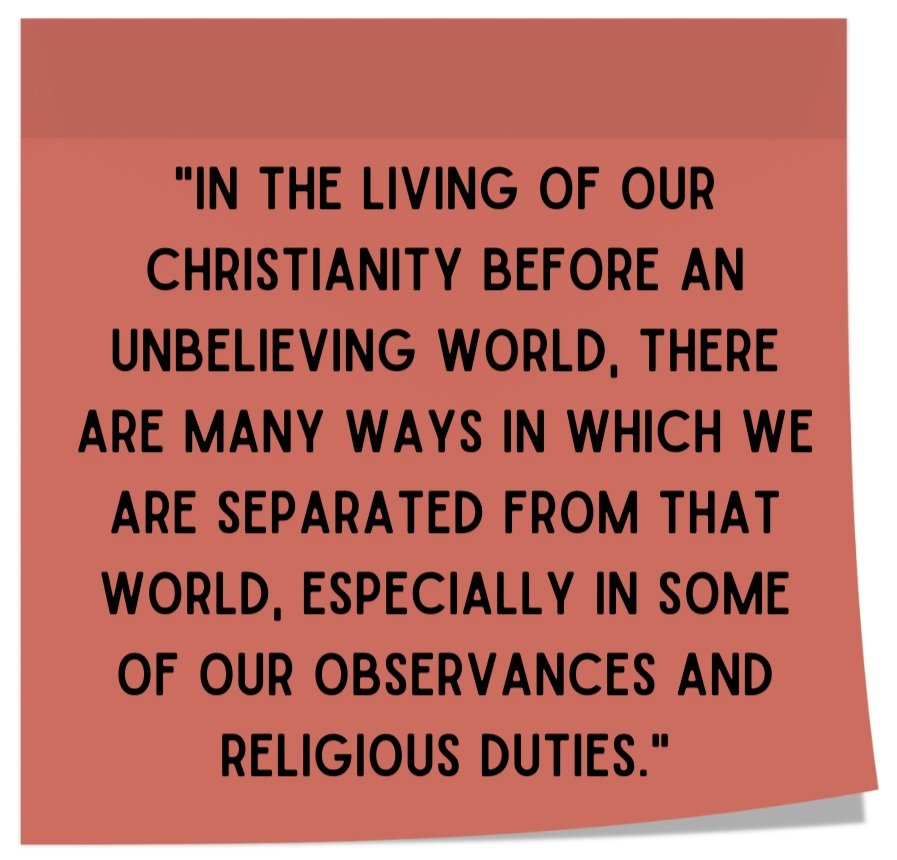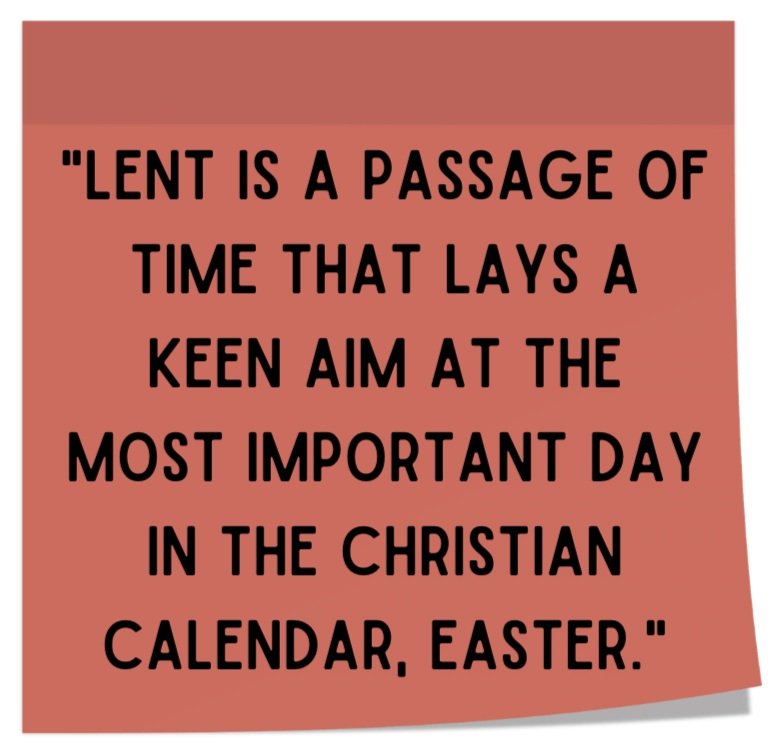Lent (but not borrowed)
By: Ian McKerracher, FBB Speaker
Here at Faith Beyond Belief, the blog-writers are a small (and growing) cadre of people who provide for the mission of informing our supporters and on-lookers with quality blogs on a variety of circumstances, issues, and opinions, all aiming to be done with a Christian Worldview. We write on topics that affect the Church corporately or us writers personally, wanting to inform our followers of the how-to and why-for of Christian living in this present world so that they can, as our tagline states, be equipped to become good ambassadors for Christ in everyday conversations.
In the living of our Christianity before an unbelieving world, there are many ways in which we are separated from that world, especially in some of our observances and religious duties. Some of these are made alive by having a day, a week, or an extended period of time set aside for such things. We call them holidays, as a direct connection to Holy Days. I have been asked to write a blog about one of these Christian holidays, the Christian religious observance of Lent. I have attended only one local church my whole Christian walk and that church is one of many which does not observe the passing of Lent. It is something that I have never considered following as a part of my life in Christ. I know that there are many Christians who do, and it is my hope that they do not think less of me for my lack of observance. I promise that I will not think less of them for their spiritual pursuit. I celebrate their choice. All this means to you, my beloved readers, is that I have a wide-open field in which I can comment about it. It is my service to you to explain this decidedly Christian practice. If you are already involved in your observance of Lent, feel free to let me know by email if I get any of this wrong.
To begin, I did some research on the practice of Lent. The name itself has a connection to an old English word coming to us by way of Germany, sometime in the linguistic past. It means “lengthening” and it references the fact that the original 40 days of Lent are the ones that correspond to the lengthening of daylight hours in the resurgence of Springtime. The history books put Lent as formalized church practice as far back as the First Council of Nicaea in 325 AD. It is observed, predominantly, in the Catholic Church these days but there are a number of Protestant denominations who now set themselves aside for Lent, especially those with a “high liturgy”. You may find Lent being celebrated in Anglican, Eastern Orthodox, Lutheran, or Reformed Churches, among others.
Lent is a passage of time that lays a keen aim at the most important day in the Christian calendar, Easter. Since the heart of the Christian faith is the fact of the resurrection of Jesus Christ from the dead, Lent is supposed to be a time of self-reflection in preparation for this enormously important celebration. Christians who observe Lent, are supposed to fast for 40 days in line with Christ’s 40 day fast in the wilderness before the start of His public ministry. If one gets a calendar out and counts the days to check my figures, they will find that there are actually 46 days between Ash Wednesday and Easter Sunday.
Traditionally, the Sundays during Lent are not counted for reasons that I cannot find. Historically, the fast began as denying the intake of any food, with perhaps some thin gruel or soup at the end of the day. Later, that was adjusted to fasting just meat, milk, butter, and eggs. Then, of those items in the storehouse, fasting only on the Fridays during Lent, leading to the practice of restricting that day’s supper to one of fish, creating what we call “Fish-Fridays.” In my parent’s house, I remember having Fish-Fridays without any understanding of the practice. I am unsure whether my parents did either. Nowadays it is even less severe. Rather than fasting food, we can deny ourselves some pleasure that we enjoy, such as television viewing, drinking, or social media.
While Ash Wednesday is the day that starts the 40-day fast, Shrove Tuesday is the significant day immediately prior. “To shrive” means to “present oneself to a priest for confession, penance, and absolution.” That Tuesday before Ash Wednesday has picked up some different names over the centuries. Sometimes it is called “Pancake Tuesday” because, with the fast of eggs and butter coming up the next day, the household would want to use up all those items in the larder. It is also called “Mardi Gras” (Fat Tuesday), which is famously celebrated in New Orleans. The surrounding culture has picked up some elements of Mardi Gras. For example, in their head-long hedonism, many have decided to engage in all the pleasures that they are supposedly surrendering in the subsequent 40 days. The word “carnival,” made famous by the celebration in Brazil, also stems from this practice. It is connected to the Latin word “carnem” which means meat or flesh, signifying that all the meat of the house must be eaten by the end of that Tuesday, making us “fat.”
Ash Wednesday is the first day of the fast. In some churches, people can line up and have their foreheads rubbed with ash in the shape of a cross. The ashes are the burnt remains of palm fronds used from the previous year’s Palm Sunday celebration. I am unsure whether they keep it on themselves throughout the 40 days, or refresh it daily, or wash it off that night. It seems that there are different practices of the duration for this ritual in different churches and for different people. Once the fast is accomplished, the observer of Lent is free to enjoy Easter to the fullest extent of their faith.
That, in a rather large nutshell, is what Lent is all about, as far as I can see. I can also see some value in its observance, especially if a person has not done a lot of self-examination throughout the rest of the year. Should a Christian feel led to allow the ash mark on their forehead to stay for any extended period, I would think that it would be essential for that person to be prepared to answer any questions about it, beyond the obvious. It may be a good idea to become acquainted with the practices and the reasons for self-examination and setting aside of sinful life patterns through ritual. One could practice answering questions that outsiders may ask or use it as an introduction to the Gospel of Jesus. Having a mark of a cross on your face would certainly be a great icebreaker.
Thanks for your support!
What part does these religious observances have in our faith? Christianity is a worldview that presents a rich tapestry of the Church’s history in worship of the true God. Christian worship requires that we love God, and serve humanity. These are the essentials of our faith. Christians can also engage in traditions that help strengthen that faith and help us refocus on Christ. These traditions, like Lent, help us learn about God within the cultural context in which we live. Because these traditions are cultural, we don’t always engage in them because they may lose their significance over time. Traditions are on a sliding scale of importance in the denominational clans of our faith. But how can we tell when a practice like Lent is a tradition worth holding onto today?
The first concern should always and forever be, “Does it correspond to the ‘whole counsel of God,’ as written in the scripture? Traditions, regardless of when they occur, need to be biblically based in the content of our chosen pursuits. When we look in the Book, we must be careful to apply proper logic in the various contexts out of which the words spring. We must weigh what we are reading with other portions found elsewhere in the Bible which may impact our passage. Things should be done “decently and in order” (1 Corinthians 14:40) and we need to ensure that we “do everything in love” (1 Corinthians 16:14). We need to consider commands like these when we are trying to decide which elective traditions we need to engage in, such as the various celebrations of the memorials of historical figures in Church history or practices like Lent. I am a fan of religious practices (properly defined) done for the right reasons and in the presence of our God. I will include those spiritual pursuits in my personal life when prompted by God (Isaiah 58 comes to mind). For me, I try to be quick to repent at any time, when a fault is brought to my attention by the Holy Spirit (who many times sounds just like my wife).
Secondly, I am not a fan of religious observances in place of spiritual realities, especially if the observances create an attitude of judgment against our brothers and sisters in Christ who don’t practice our tradition. I am not big on fasting as a religious observance in general. I suppose it could be said that this is one reason I am big because I don’t fast enough (guffaw). I do enjoy a good party with family and friends for Easter. But my opposition to making Lent mandatory is more than just my preference for eating. Practices like Lent should be available to help Christians grow in their faith. If they help a Christian with their faith, then I’m all for it. If they don’t help, then Christians should be free to set it aside for another faith practice. I like what Rupertus Meldenius had to say way back in 1626, “In essentials unity, in non-essentials liberty, in all things charity.” It is my hope that the observance of Lent is seen as an option and not an absolute.
I would say that those who believe Lent is an obligatory religious duty for the whole Church is limited to specific denominations. I would also say that, within the Christian community, there are few that would demand that the practitioners should stop. While I see some value in Lent, it seems to me to contain some of those essentials that should be observed throughout the whole year. I guess that I am one of those lower liturgy kinds of Christians. However, if you observe Lent, I hope you have a joyous time of it in Christ.
Check out our latest podcast
What is the First Nations Version of the Bible?
Check out
The Worldview Course!



















